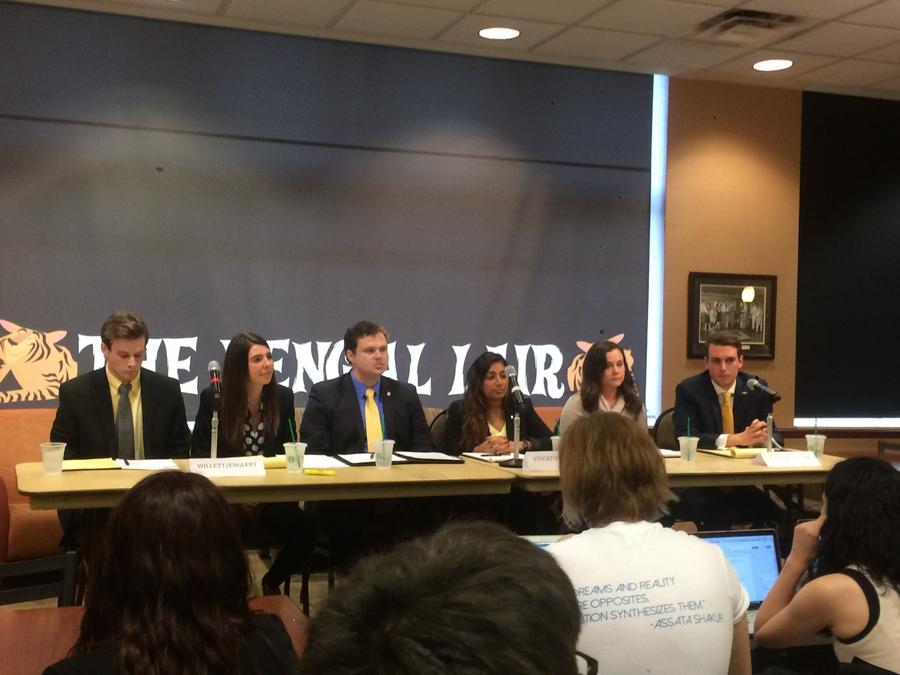
_This article has been update to reflect additional details about previous female MSA presidents._
The candidates for Missouri Students Association president and vice president participated in the first debate of the election cycle Tuesday night. The next debate will be at 6 p.m. Feb. 27 at the Shack. Voting for the election opens March 6 at vote.missouri.edu and ends March 8, with the announcement of the winner to follow full Senate.
The debate, which lasted two hours, covered a variety of topics, including social justice issues, the slates’ platforms and divesting from prison labor.
Here are five notable moments from the debate:
**1. The slates do not agree on whether they support a past joint session resolution that calls for MU to divest from prison labor.**
Presidential candidate Nathan Willett said he did not support the resolution and that he has visited the Jefferson City Correctional Center.
“To address this situation, I think people need to see it first-hand,” Willett said. “I got to shake hands and talk to some of the inmates, and that’s what they love to do, they take pride and passion for it. I do not support the resolution because we need to look more into it.”
Presidential candidate Josh Stockton said he supported the resolution.
Presidential candidate Tori Schafer, the current MSA vice president, said more information needs to “get gathered” before “we can make an official statement.”
But MSA has made an official resolution advocating for MU to divest from prison labor. A resolution functions as an official statement from the body, and all members are expected to uphold the language of the resolution after it’s passed. The resolution passed in joint session last spring.
“Personally knowing someone who was in prison and did prison labor, they do take a lot of joy in those projects and do take a lot of joy in those social interactions,” Schafer said.
**2. Schafer, if elected, would be the second female MSA president in 10 years.**
In her opening statement, Schafer described her first experiences as a woman in MSA. She said that when she first joined, all the legislative committee chairs were men, and she was told upon appointment as a chairwoman that she needed to wear heels to meetings to appear more commanding.
Schafer said “we have not had a Missouri Students Association woman in the past 10 years,” referring to the presidency. Schafer would not be the first female MSA president in 10 years, but she would be the first elected, as the most recent female MSA president, Kelsey Kaberberger in 2015, was a vice president who later assumed the presidency. The most recent after her was Rachel Anderson in 2007. If elected, Schafer would be the second female president in 10 years, the third in 11.
Seven out of the past 10 MSA president and vice president pairs have been composed of a male president and a female vice president, including the current administration. Both other slates currently running for election are set up with a woman as vice president and a man as president.
**3. All three MSA slates plan to spend over $1,000 on their campaign.**
When asked to disclose how much money their campaigns planned to spend, Schafer said their campaign would spend around $1,800, and Stockton/Gulati said they would spend around $1,500. Willett/Englert had raised $4,885 as of Tuesday night for their campaign through a GoFundMe.
All three slates agreed campaign funding and endorsements should be regulated and that the cost of running an MSA campaign can be a barrier for the involvement of some students. The goal of the Willett/Englert GoFundMe was $10,000. Stockton/Gulati, who also created a GoFundMe, set their goal at $4,301.
Willett said the money their campaign doesn’t use will be donated to an organization of their choice.
Schafer/de Leon do not have a GoFundMe and encouraged students to donate to the It’s On Us sexual assault prevention campaign instead.
**4. The three slates all support the Enhance Mizzou fee.**
The fee would be $2.91 per credit hour, with a maximum total of $35 for a full-time undergraduate. If passed this March, the fee would go into effect for fall 2017. Enhance Mizzou focuses on improving student access to mental health services and extending student resources, namely library hours.
Last semester, students created a petition, which gained over 2,000 signatures, to have the library hours extend to 24 hours a day, five days a week. The library used to operate during these hours, but after the failure of the library fee last year, the library has closed at midnight from Sunday to Thursday and at 7 p.m. on Friday and Saturday. The Enhance Mizzou fee will provide the financial support to extend hours of operation.
The fee also creates three new permanent counseling positions at the Counseling Center.
**5. When asked which student group MU has not worked closely enough with, both Stockton/Gulati and Willett/Englert said they support increased collaboration between Greek Life and MSA.**
The Schafer/de Leon slate says that there should be increased collaboration with organizations that advocate for marginalized students, especially the Muslim Student Organization.
“I would say, more important than those groups, one group that is the most important right now… There are a lot, but I think the most important right now is the Muslim Student Organization,” Riley de Leon said, responding to Stockton’s claim that MSA has not reached out to the Trulaske College of Business and Greek Life.
_Edited by Emily Gallion | [email protected]_